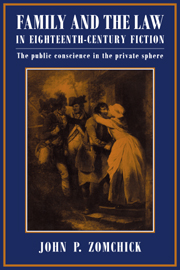Book contents
- Frontmatter
- Contents
- Preface
- Acknowledgments
- 1 Introduction
- 2 Roxana's contractual affiliations
- 3 Clarissa Harlowe: caught in the contract
- 4 Tame spirits, brave fellows, and the web of law: Robert Lovelace's legalistic conscience
- 5 Roderick Random: suited by the law
- 6 Shadows of the prison house or shade of the family tree: Amelia's public and private worlds
- 7 The embattled middle: longing for authority in The Vicar of Wakefield
- 8 Caleb Williams: negating the romance of the public conscience
- Bibliography
- Index
7 - The embattled middle: longing for authority in The Vicar of Wakefield
Published online by Cambridge University Press: 10 February 2010
- Frontmatter
- Contents
- Preface
- Acknowledgments
- 1 Introduction
- 2 Roxana's contractual affiliations
- 3 Clarissa Harlowe: caught in the contract
- 4 Tame spirits, brave fellows, and the web of law: Robert Lovelace's legalistic conscience
- 5 Roderick Random: suited by the law
- 6 Shadows of the prison house or shade of the family tree: Amelia's public and private worlds
- 7 The embattled middle: longing for authority in The Vicar of Wakefield
- 8 Caleb Williams: negating the romance of the public conscience
- Bibliography
- Index
Summary
Filial obedience is the first and greatest requisite of a state; by this we become good subjects to our emperors, capable of behaving with just subordination to our superiors … the whole state may be said to resemble one family, of which the Emperor is the protector, father, and friend.
Oliver Goldsmith, The Citizen of the World, Letter 42, Works, 2:177Political stability, narrative division, and critical certainty
Clarissa, Roderick Random, and Amelia were published between 1747 and 1752, a time of relative political stability in England. The years in which Oliver Goldsmith wrote The Vicar of Wakefield, on the other hand, were years of political unrest and ministerial instability. In 1760 George III had acceded to the throne with intentions of “cleansing the Augean stables” of national government and punishing those ministers who had usurped his grandfather's authority. The new monarch never fully realized his intentions, however, in part because the 1760s saw the simultaneous growth of political parties and popular activism that contested the King's influence in national affairs. Discontent over the King's choice of the Earl of Bute to head the government and his ministry's unsuccessful prosecution of Wilkes for the North Briton 45 illustrate the limits to the sovereign's power. These political tensions of the 60s – a crisis of authority – inform Goldsmith's fiction, including its personal solution to the problem of instability. In effect, The Vicar deploys a juridical subjectivity in its protagonist, but props it upon the personal presence of Sir William Thornhill, who acts as the fiction's supreme magistrate.
- Type
- Chapter
- Information
- Family and the Law in Eighteenth-Century FictionThe Public Conscience in the Private Sphere, pp. 154 - 176Publisher: Cambridge University PressPrint publication year: 1993



